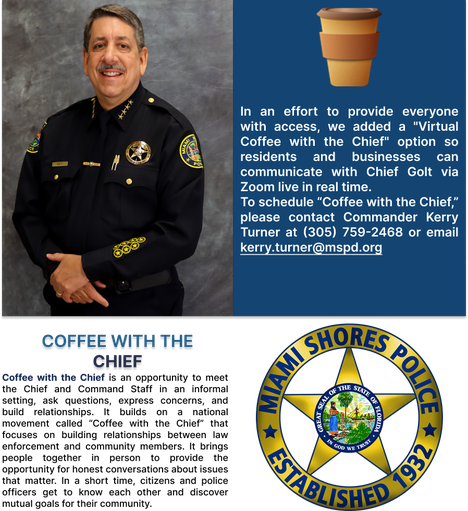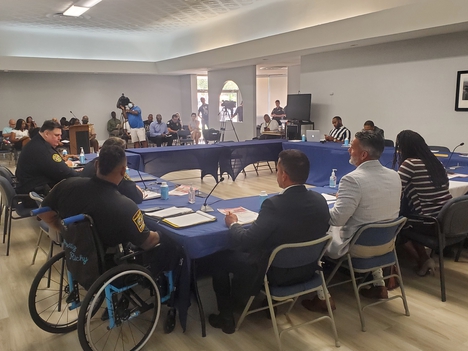Community Engagement
Every year the Miami Shores Police Department hosts a shred day event aimed at prioritizing the protection of personal information and raise awareness about the importance of secure document disposal. This initiative allows the community a safe and secure way to dispose of sensitive documents. These events typically involve the shredding and destruction of confidential papers to protect against identity theft and fraud. During shred day, community members are invited to bring their unwanted or outdated documents containing personal information, such as old bank statements, tax records, medical records, and other sensitive paperwork. The Miami Shores Police Department partners with a professional shredding company that brings mobile shredding equipment to the event location.
At the shred day event, participants can hand over their documents to the shredding professionals, who will securely destroy the materials on-site using industrial shredding machinery. This process ensures that personal information is effectively rendered unreadable and reduces the risk of identity theft.
If anyone is interested in participating in the Miami Shores Police Department's shred day event, it is recommended to check our official website or social media pages for updates on the date and time of the event. These platforms are likely to provide the most up-to-date information about shred day and any additional details or requirements for participation.
A DEA prescription drug take-back program refers to a coordinated effort by the U.S. Drug Enforcement Administration (DEA) to collect and safely dispose of unused or expired prescription drugs. The purpose of the program is to provide a convenient and responsible way for individuals to dispose of medications they no longer need, thereby reducing the risk of diversion, misuse, or accidental ingestion.
The DEA periodically organizes National Prescription Drug Take-Back Days, during which designated collection sites, such as pharmacies, hospitals, or law enforcement agencies, are set up to accept prescription medications from the public. These events are typically widely publicized, and individuals can bring their unused or expired medications to the collection sites for proper disposal.
Prescription drug take-back programs have several benefits. They help prevent prescription drugs from ending up in the wrong hands, including children, teenagers, or individuals with substance abuse issues. They also minimize the environmental impact that may occur if medications are improperly disposed of by flushing them down the toilet or throwing them in the trash, which can contaminate water supplies and harm wildlife.
It's important to note that while the DEA organizes nationwide take-back events, some local communities may have year-round collection sites where individuals can drop off their unused medications. These locations can be pharmacies, hospitals, or law enforcement agencies, so it's worth checking with your local authorities or healthcare providers to find out if such programs are available in your area.
If you have prescription medications that you no longer need and there is no take-back program available, you can follow specific guidelines for safe disposal. The FDA recommends mixing the medications with an undesirable substance, such as coffee grounds or kitty litter, placing them in a sealed container, and throwing them in the trash. However, it's always a good idea to consult local regulations or guidelines, as they may vary depending on your location.
Remember, it's essential to never share prescription medications with others or use medications prescribed to someone else, as it can be dangerous and illegal. If you have any questions or concerns regarding the proper disposal of prescription drugs, it's best to consult with your pharmacist or healthcare provider.
Click HERE for the latest information from the DEA take-back day
Due to the potential for inclement weather and school closures in Miami-Dade County, the Bike to School Event, scheduled for Miami Shores schools on October 9th, 2024, has been cancelled.
Bike to School Day is an annual event that encourages students, parents, and school staff to choose active transportation by biking to school. It promotes the benefits of biking, such as improved physical fitness, reduced traffic congestion, and a more sustainable environment. Bike to School Day typically takes place on a designated day in the spring and involves schools and communities across the country.
The objectives of Bike to School Day are as follows:
- Encouraging physical activity: Biking to school promotes physical exercise and helps children incorporate physical activity into their daily routine. It contributes to better cardiovascular health, improved muscular strength, and enhanced mental well-being.
- Promoting active transportation: By choosing biking as a mode of transportation, students and their families reduce reliance on motor vehicles. This reduces traffic congestion around schools, improves air quality, and helps create safer environments for pedestrians and cyclists.
- Enhancing safety awareness: Bike to School Day highlights the importance of bicycle safety. It provides an opportunity to educate participants about proper helmet use, bike maintenance, and obeying traffic rules. This helps create a culture of safety and responsibility among young cyclists.
- Fostering community engagement: Bike to School Day brings together students, parents, school staff, and community members. It promotes community spirit, encourages social interaction, and strengthens the connection between schools and their surrounding neighborhoods.
To participate in Bike to School Day, students and their families can follow these steps:
- Check with your school: Find out if your school is participating in Bike to School Day and learn about any specific activities or guidelines they have in place.
- Plan the route: Determine the safest and most convenient biking route from your home to the school. Consider factors such as traffic volume, intersections, and bike lanes.
- Bike safety check: Ensure that your bicycle is in good working condition. Check the brakes, tires, lights, and reflectors. If needed, have a professional inspect and tune-up your bike.
- Practice safety measures: Always wear a properly fitting helmet and brightly colored clothing. Observe traffic rules, use hand signals, and stay visible to motorists. Remind children about the importance of being cautious and aware of their surroundings.
- Coordinate with friends and neighbors: Encourage classmates and neighbors to participate in Bike to School Day. Consider forming a group to ride together, which can increase safety and create a fun and supportive atmosphere.
- Share the experience: Take photos or videos of your Bike to School Day journey and share them on social media, using the designated hashtags to contribute to the wider movement.
Remember, Bike to School Day is not limited to a single event. It can inspire a lasting change in commuting habits, encouraging students and their families to continue biking to school regularly. By embracing active transportation, we can promote healthier lifestyles, reduce traffic congestion, and foster a more sustainable future.
Mobility Week is an event that promotes alternative modes of transportation and encourages community members to embrace sustainable and active transportation options. Every year the Miami Shores Police Department actively participates in this event and collaborates with the community.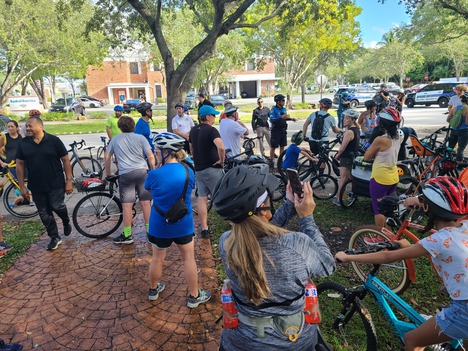
During Mobility Week, various activities and initiatives are organized to raise awareness about transportation choices that can reduce traffic congestion, improve air quality, and enhance public health. These may include events such as bike rides, walking tours, public transportation promotions, and educational campaigns about the benefits of carpooling or using electric vehicles.
By joining the community in celebrating Mobility Week, the Miami Shores Police Department shows its commitment to fostering a sustainable and eco-friendly environment. Their involvement helps to build stronger connections with residents and encourages everyone to make conscious choices when it comes to transportation.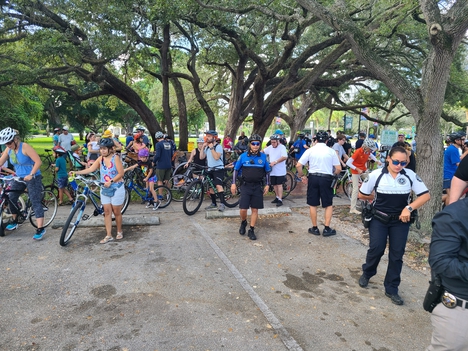
If you're interested in specific details about the activities and events, it would be best to reach out to the Miami Shores Community Center or hit the link below, which will take you to the FDOT site for the latest updates.
Miami-Dade County Join Mobility Week
Our agency participates in community outreach programs aimed at building positive relationships with young people. These programs often involve activities like school visits, community events, or reading programs at our library. However, the focus of these activities tends to be on younger children, usually in the elementary school age range. The Miami Shores Police Department has been actively involved in the teen series library; it’s a commendable initiative that can contribute to the overall well-being and development of children.
I encourage you to contact the library directly for more details about their programs and events.
Civilian mobile patrol is comprised of community members who are not law enforcement professionals. Civilian mobile patrols typically involve community members who volunteer their time and efforts to patrol neighborhoods, public spaces, or specific areas within their community.
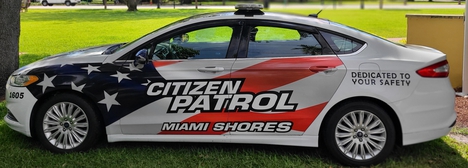
Civilian mobile patrols can play a variety of roles, depending on the specific objectives and guidelines set by the organizing community group. Some common activities include:
- Increased visibility: Patrols are often conducted in marked vehicles or on foot, aiming to create a visible presence that deters potential criminal activity. By regularly patrolling an area, civilians can discourage criminals who may be less likely to engage in illegal activities when they know they are being observed.
- Reporting and communication: Civilian patrols are encouraged to report any suspicious activities or incidents they encounter to law enforcement agencies. Effective communication channels are established to relay information promptly and accurately, assisting law enforcement in their response and investigations.
- Community engagement: Patrol volunteers have the opportunity to engage with community members, fostering positive relationships and promoting a sense of unity and cooperation. By interacting with residents, they can address concerns, provide information on crime prevention, and encourage community involvement in maintaining safety.
- Observational support: Civilian patrols can assist in monitoring and identifying potential hazards or safety concerns, such as malfunctioning streetlights, abandoned properties, or other conditions that may contribute to crime or accidents. Reporting such issues to the appropriate authorities helps ensure a timely response and resolution
It is important to note that civilian mobile patrols should always operate within the framework of local laws and regulations. They should maintain a cooperative relationship with local law enforcement agencies, respecting their jurisdiction and expertise. Regular communication and collaboration between civilian patrols and law enforcement help establish effective working partnerships and ensure that efforts are aligned with community needs and priorities.
Civilian mobile patrols can be a valuable supplement to law enforcement efforts, as they provide an additional layer of vigilance and community engagement. By empowering community members to actively participate in enhancing public safety, these patrols can help create a safer environment, foster community cohesion, and encourage a shared responsibility for the well-being of the neighborhood or community as a whole.
If you are interested in participating in the Miami Shores Police Department Mobile Patrol program, please email Captain Paul Cazzola at paul.cazzola@mspd.org
800-799-7233
800-799-7233
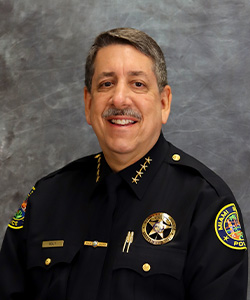
David Golt, Chief of Police
David.Golt@mspd.org

